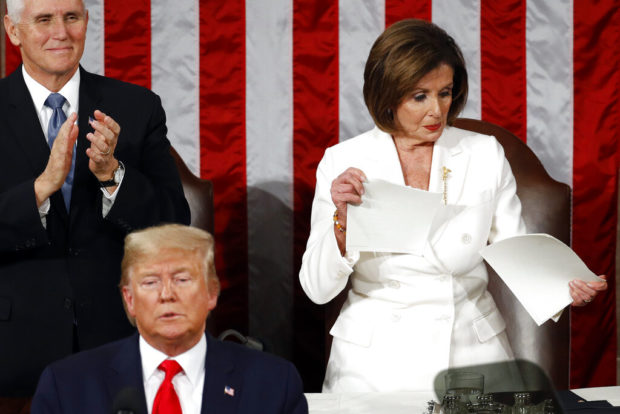AP FACT CHECK: Ripping up copy of Trump’s speech not illegal

House Speaker Nancy Pelosi of Calif., tears her copy of President Donald Trump’s s State of the Union address after he delivered it to a joint session of Congress on Capitol Hill in Washington, Tuesday. Vice President Mike Pence is at left. (AP)
WASHINGTON — There’s no disputing that House Speaker Nancy Pelosi caused quite a stir when she tore up her copy of President Donald Trump’s State of the Union speech at the end of his address. Pelosi said she decided to shred what she saw as a “compilation of falsehoods” to make a statement “that clearly indicates to the American people that this is not the truth.”
Trump and his Republican allies, for their part, saw Pelosi’s action as an act of disrespect — and an illegal one at that. Legal experts disagreed, saying the speech was Pelosi’s to do with what she wanted.
TRUMP: “I thought it was a terrible thing when she ripped up the speech. First of all, it’s an official document. You’re not allowed. It’s illegal what she did. She broke the law.”
THE FACTS:
Legal experts say no laws were broken. They said it was not an original government document, but Pelosi’s copy of the speech.
Steven Aftergood, a records expert at the private Federation of American Scientists, said: “Legally, this is a non-issue. Pelosi was expressing contempt for the president’s speech, and her views are constitutionally protected.”
He said her torn-up pieces of the speech might themselves be considered a new record of historical value.
Laurence Tribe, a constitutional law professor at Harvard University, said Pelosi did not violate 18 U.S. Code Section 2071, the federal law defining the deliberate destruction of an official record that has been filed with a court or other government agency — a felony punishable by a prison term and by forfeiture of office.
Heidi Kitrosser, a law professor at the University of Minnesota, said: “This is not an archival document. … This is one of many, many, many copies of President Trump’s speech and Nancy Pelosi is free to do with it whatever she will.”
Kitrosser added that any disagreement with Trump’s speech is protected by the First Amendment “and in Pelosi’s case, under the speech and debate clause of the Constitution.”